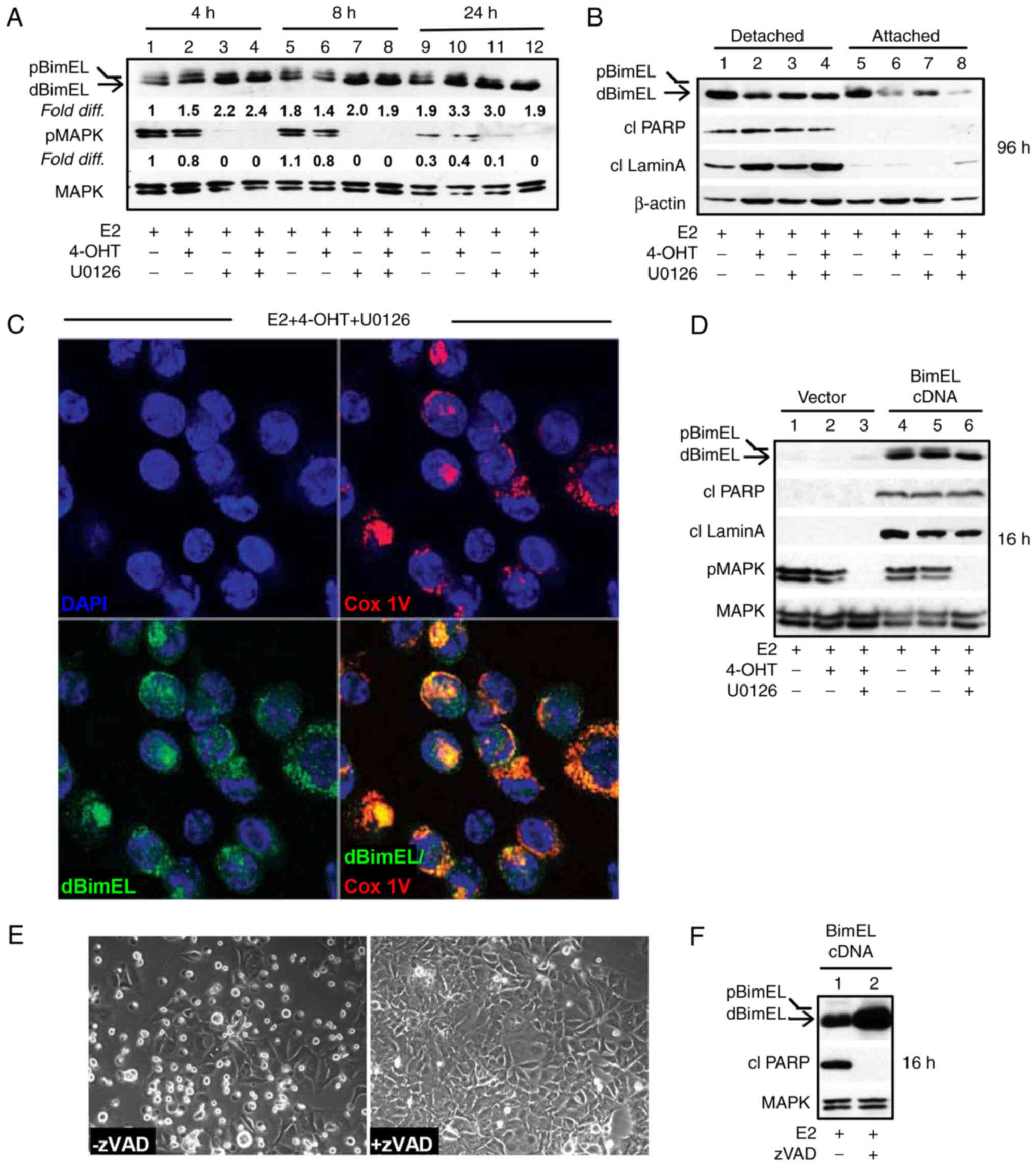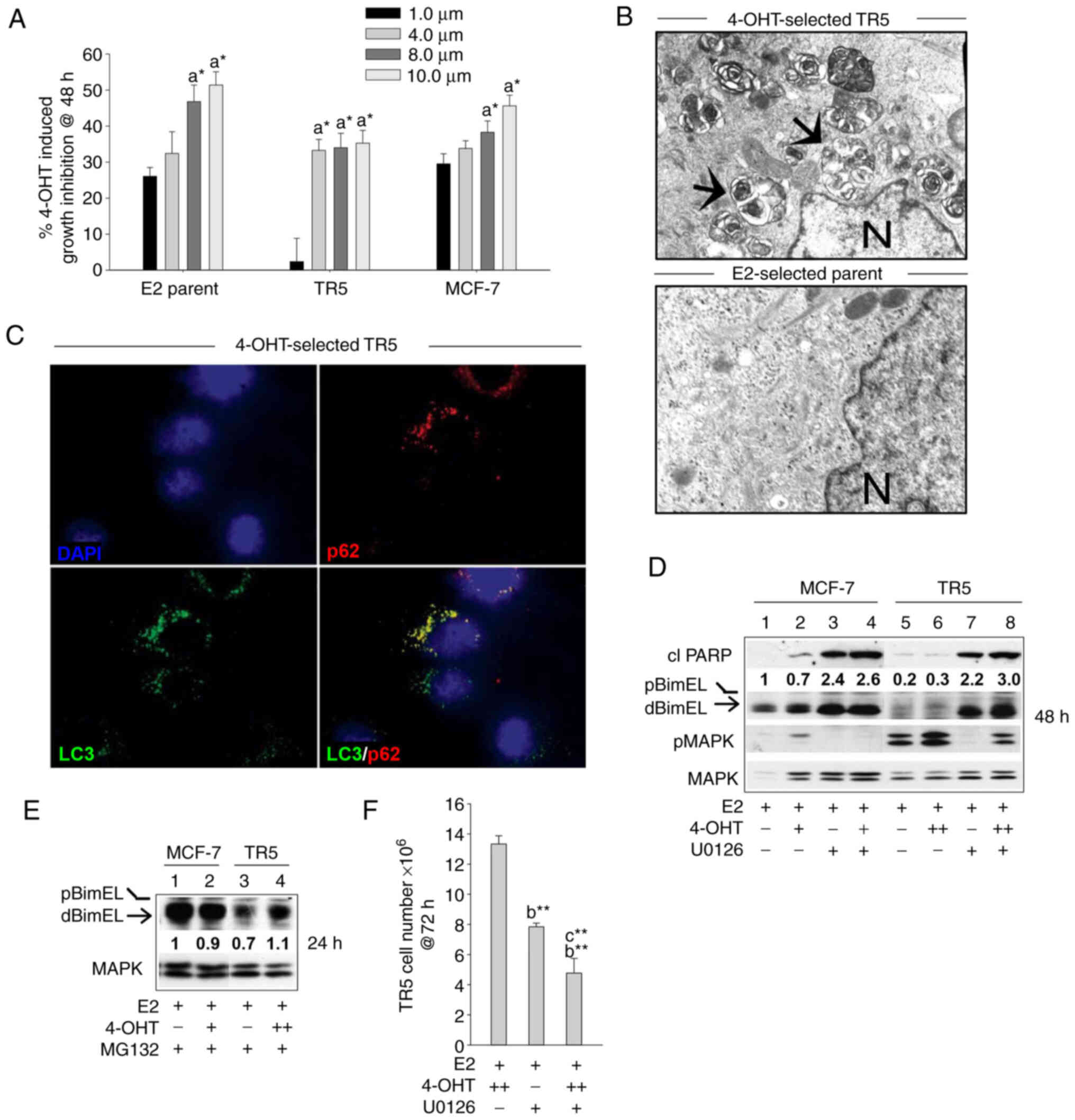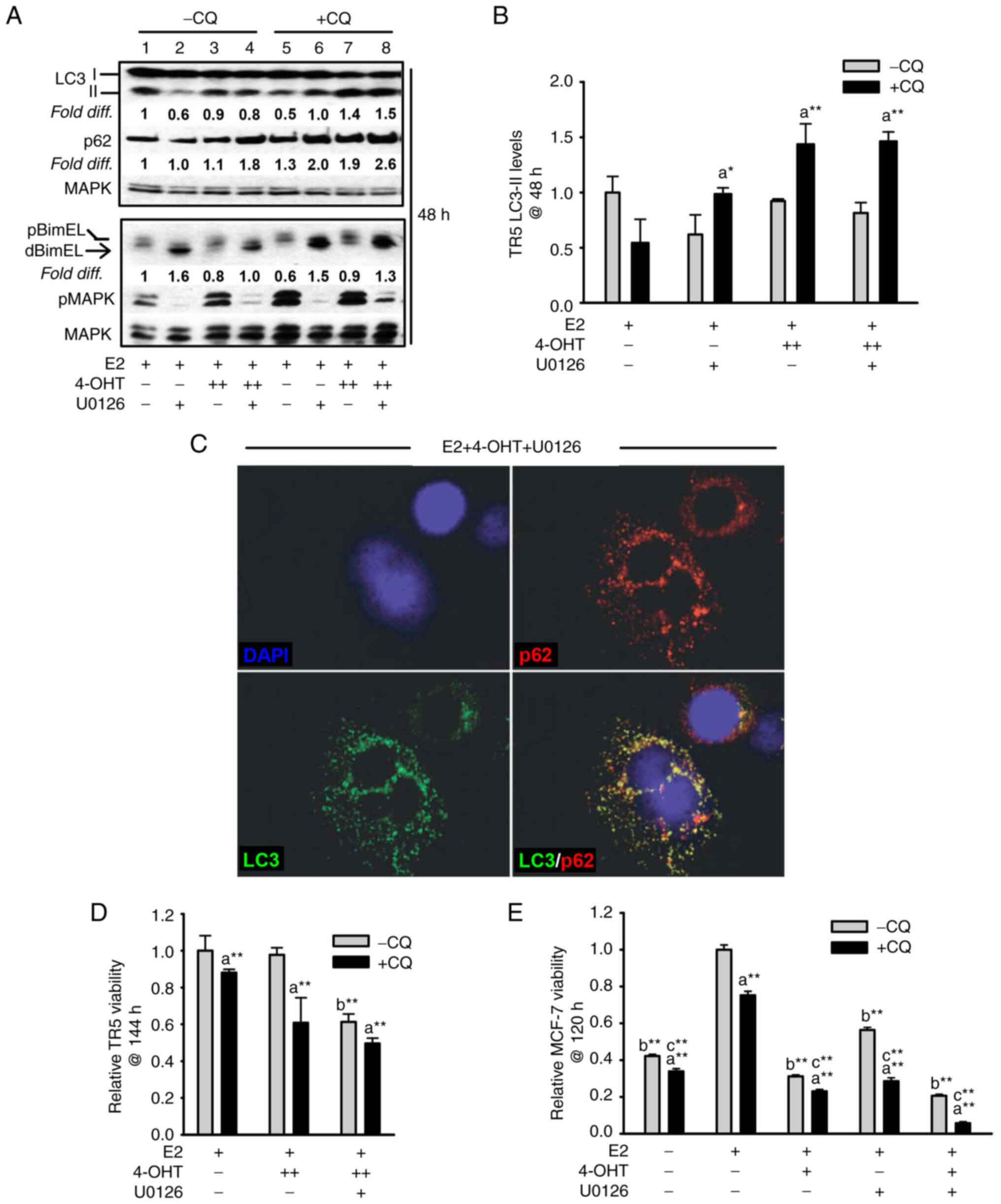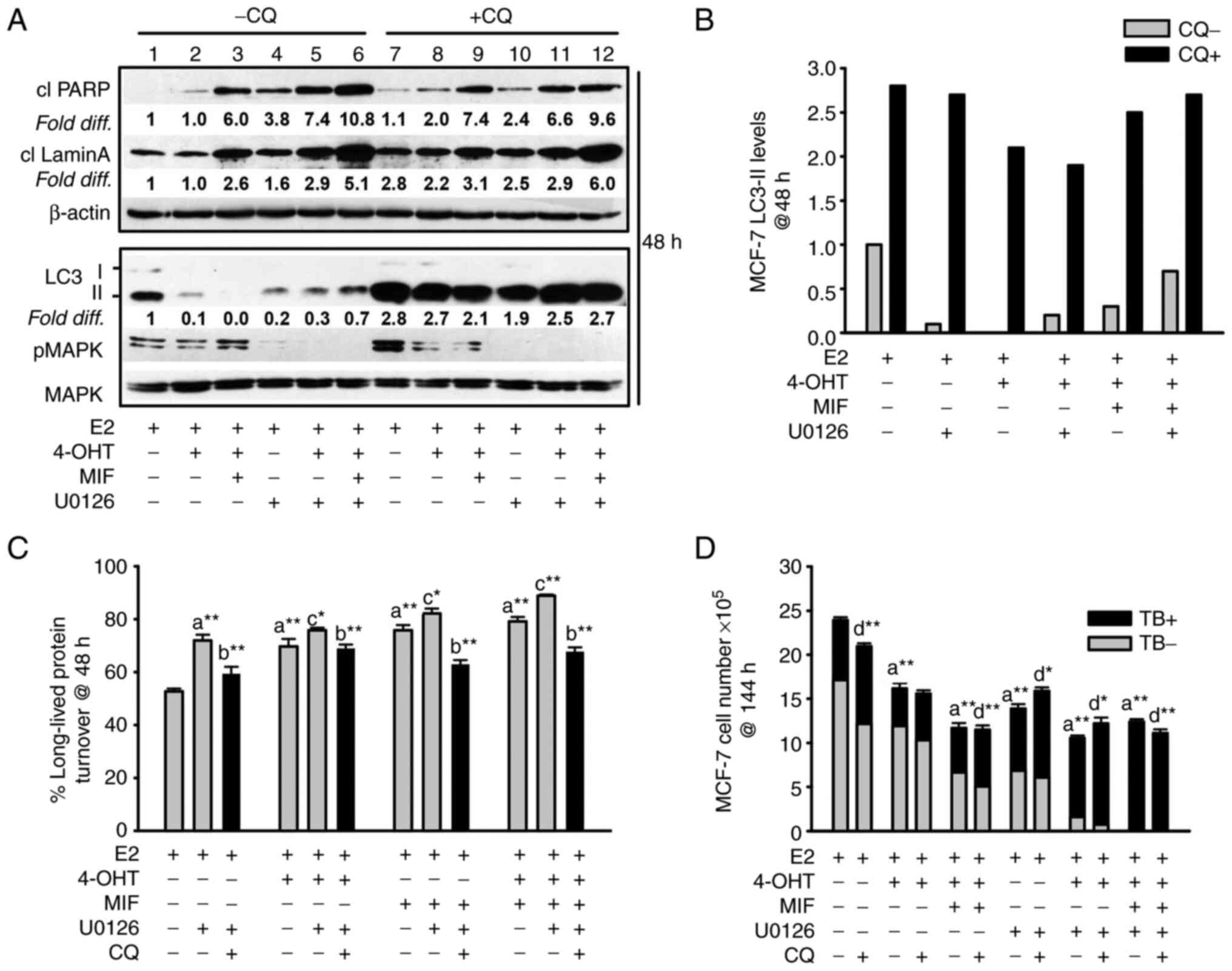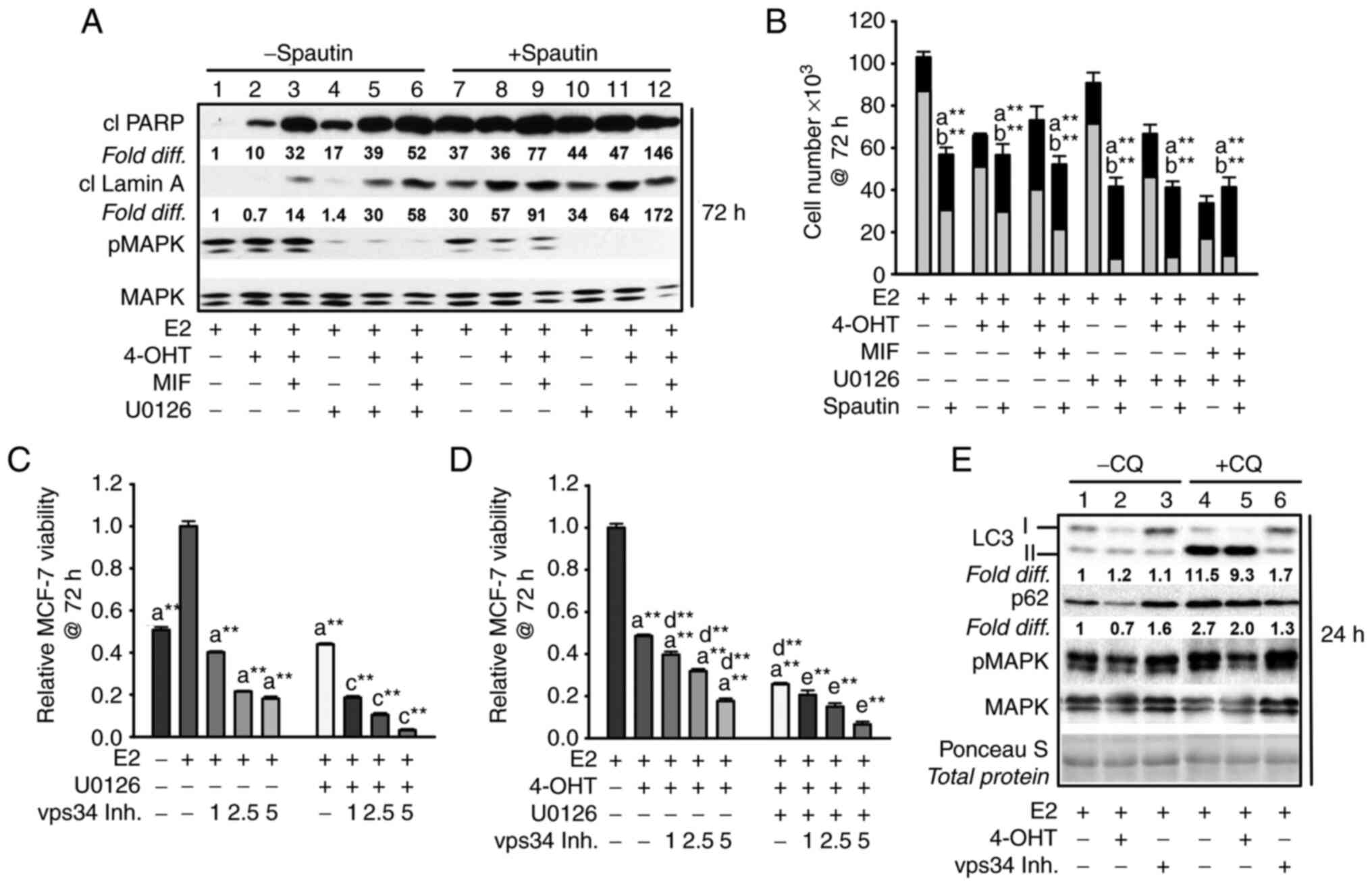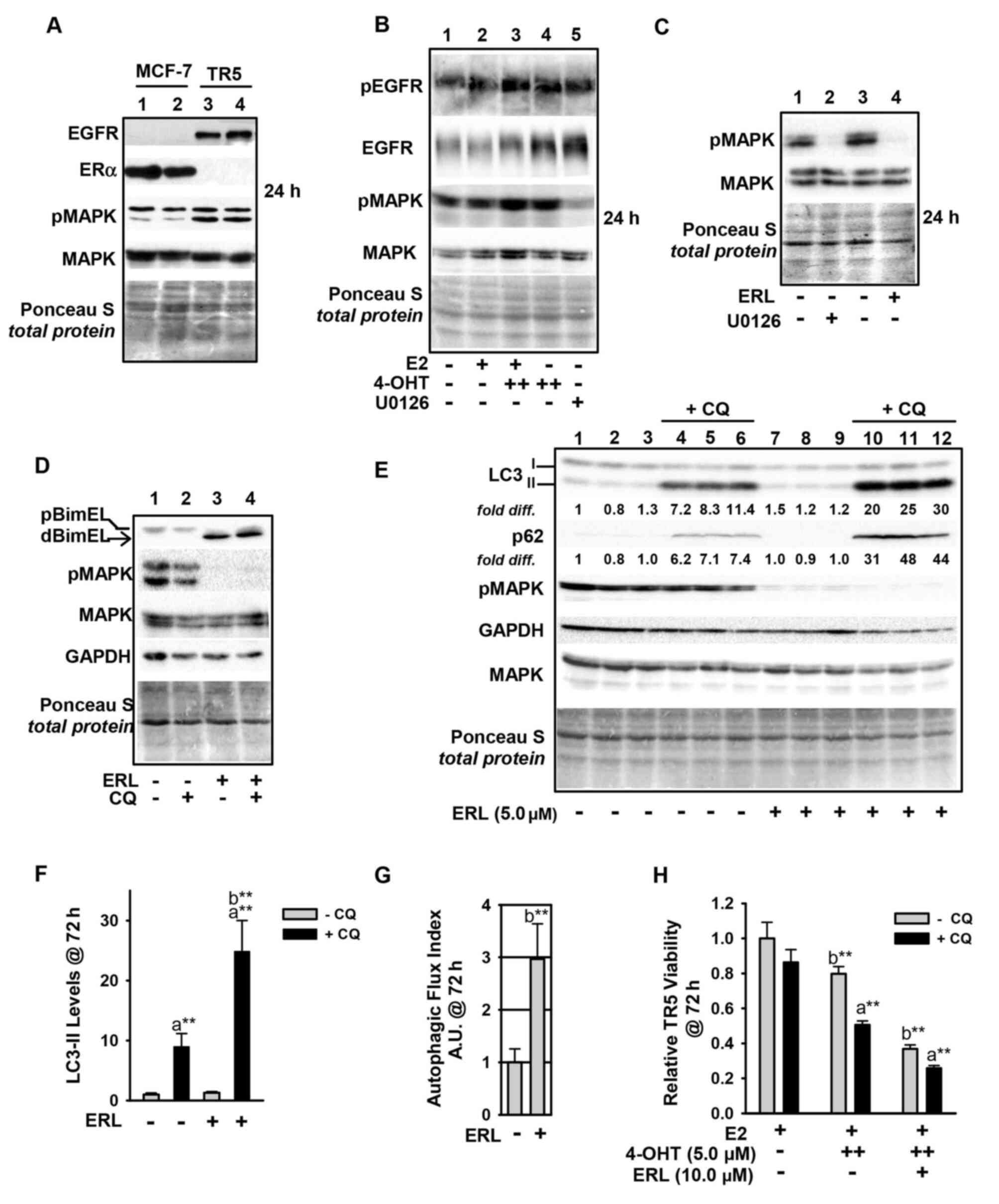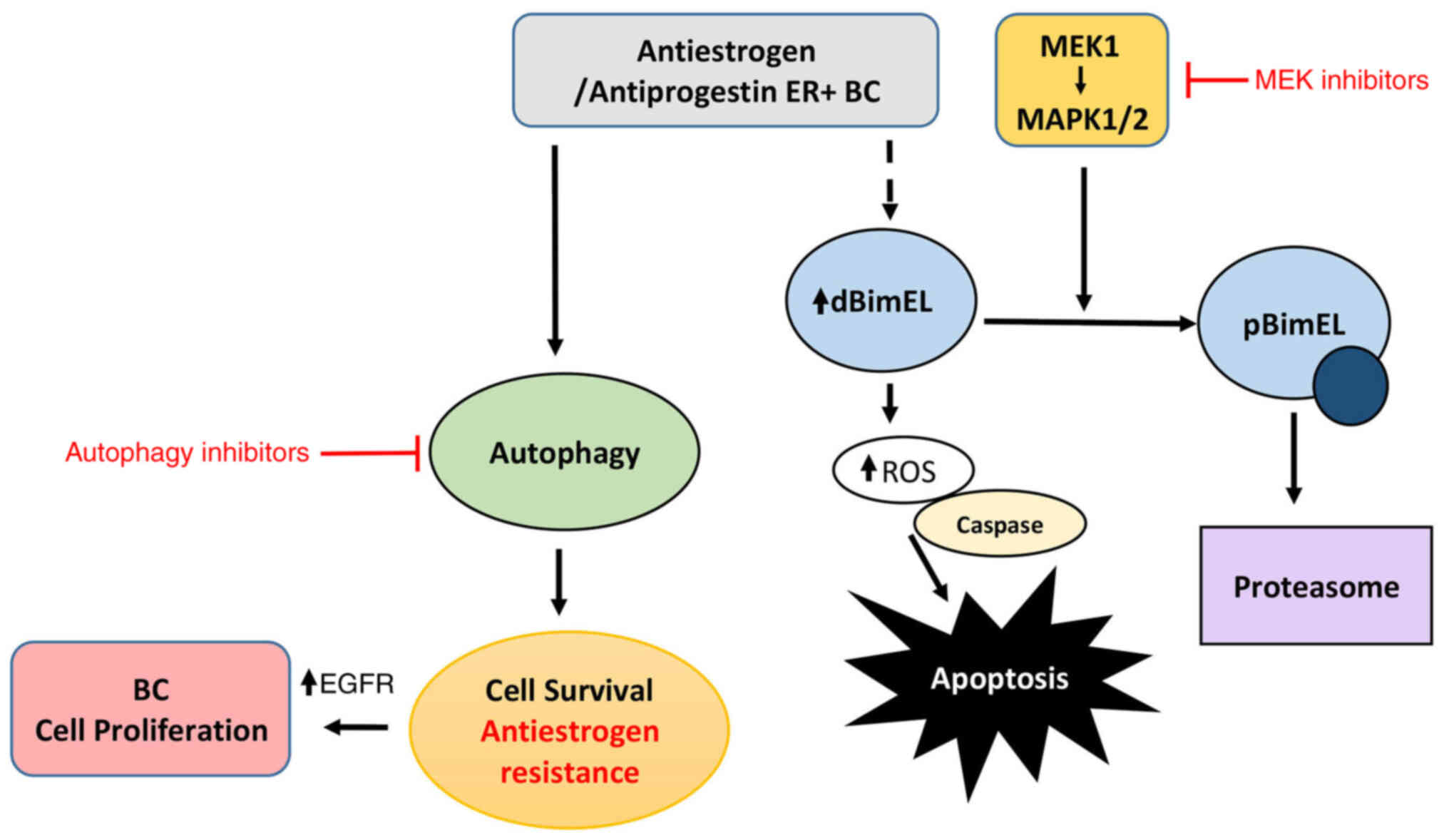|
1
|
Senkus E, Kyriakides S, Ohno S,
Penault-Llorca F, Poortmans P, Rutgers E and Zackrisson S: Primary
breast cancer: ESMO clinical practice guidelines for diagnosis,
treatment and follow-up. Ann Oncol. 26(Suppl 5): v8–v30. 2015.
View Article : Google Scholar : PubMed/NCBI
|
|
2
|
Early Breast Cancer Trialists'
Collaborative Group (EBCTCG); Davies C, Godwin J, Gray R, Clarke M,
Cutter D, Darby S, McGale P, Pan HC, Taylor C, et al: Relevance of
breast cancer hormone receptors and other factors to the efficacy
of adjuvant tamoxifen: Patient-level meta-analysis of randomised
trials. Lancet. 378:771–784. 2011. View Article : Google Scholar : PubMed/NCBI
|
|
3
|
Strasser-Weippl K, Badovinac-Crnjevic T,
Fan L and Goss PE: Extended adjuvant endocrine therapy in
hormone-receptor positive breast cancer. Breast. 22(Suppl 2):
S171–S175. 2013. View Article : Google Scholar : PubMed/NCBI
|
|
4
|
Nardone A, De Angelis C, Trivedi MV,
Osborne CK and Schiff R: The changing role of ER in endocrine
resistance. Breast. 24(Suppl 2): S60–S66. 2015. View Article : Google Scholar : PubMed/NCBI
|
|
5
|
Dodwell D, Wardley A and Johnston S:
Postmenopausal advanced breast cancer: Options for therapy after
tamoxifen and aromatase inhibitors. Breast. 15:584–594. 2006.
View Article : Google Scholar : PubMed/NCBI
|
|
6
|
Hartkopf AD, Grischke EM and Brucker SY:
Endocrine-resistant breast cancer: Mechanisms and treatment. Breast
Care (Basel). 15:347–354. 2020. View Article : Google Scholar : PubMed/NCBI
|
|
7
|
Clarke R, Jones BC, Sevigny CM,
Hilakivi-Clarke LA and Sengupta S: Experimental models of endocrine
responsive breast cancer: Strengths, limitations, and use. Cancer
Drug Resist. 4:762–783. 2021.PubMed/NCBI
|
|
8
|
Shah M, Nunes MR and Stearns V: CDK4/6
inhibitors: Game changers in the management of hormone
receptor-positive advanced breast cancer? Oncology (Williston
Park). 32:216–222. 2018.PubMed/NCBI
|
|
9
|
Li Z, Zou W, Zhang J, Zhang Y, Xu Q, Li S
and Chen C: Mechanisms of CDK4/6 inhibitor resistance in luminal
breast cancer. Front Pharmacol. 11:5802512020. View Article : Google Scholar : PubMed/NCBI
|
|
10
|
Sharifi MN, Anandan A, Grogan P and
O'Regan RM: Therapy after cyclin-dependent kinase inhibition in
metastatic hormone receptor-positive breast cancer: Resistance
mechanisms and novel treatment strategies. Cancer. 126:3400–3416.
2020. View Article : Google Scholar : PubMed/NCBI
|
|
11
|
Gaddy VT, Barrett JT, Delk JN, Kallab AM,
Porter AG and Schoenlein PV: Mifepristone induces growth arrest,
caspase activation, and apoptosis of estrogen receptor-expressing,
antiestrogen-resistant breast cancer cells. Clin Cancer Res.
10:5215–5225. 2004. View Article : Google Scholar : PubMed/NCBI
|
|
12
|
Schoenlein PV, Hou M, Samaddar JS, Gaddy
VT, Thangaraju M, Lewis J, Johnson M, Ganapathy V, Kallab A and
Barrett JT: Downregulation of retinoblastoma protein is involved in
the enhanced cytotoxicity of 4-hydroxytamoxifen plus mifepristone
combination therapy versus antiestrogen monotherapy of human breast
cancer. Int J Oncol. 31:643–655. 2007.PubMed/NCBI
|
|
13
|
El Etreby MF, Liang Y, Wrenn RW and
Schoenlein PV: Additive effect of mifepristone and tamoxifen on
apoptotic pathways in MCF-7 human breast cancer cells. Breast
Cancer Res Treat. 51:149–168. 1998. View Article : Google Scholar
|
|
14
|
El Etreby MF and Liang Y: Effect of
antiprogestins and tamoxifen on growth inhibition of MCF-7 human
breast cancer cells in nude mice. Breast Cancer Res Treat.
49:109–117. 1998. View Article : Google Scholar : PubMed/NCBI
|
|
15
|
Klijn JG, Setyono-Han B and Foekens JA:
Progesterone antagonists and progesterone receptor modulators in
the treatment of breast cancer. Steroids. 65:825–830. 2000.
View Article : Google Scholar : PubMed/NCBI
|
|
16
|
Periyasamy-Thandavan S, Takhar S, Singer
A, Dohn MR, Jackson WH, Welborn AE, LeRoith D, Marrero M,
Thangaraju M, Huang S and Schoenlein PV: Insulin-like growth factor
1 attenuates antiestrogen- and antiprogestin-induced apoptosis in
ER+ breast cancer cells by MEK1 regulation of the BH3-only
pro-apoptotic protein Bim. Breast Cancer Res. 14:R522012.
View Article : Google Scholar : PubMed/NCBI
|
|
17
|
Ying HQ, Chen J, He BS, Pan YQ, Wang F,
Deng QW, Sun HL, Liu X and Wang SK: The effect of BIM deletion
polymorphism on intrinsic resistance and clinical outcome of cancer
patient with kinase inhibitor therapy. Sci Rep. 5:113482015.
View Article : Google Scholar : PubMed/NCBI
|
|
18
|
Chakraborty AR, Robey RW, Luchenko VL,
Zhan Z, Piekarz RL, Gillet JP, Kossenkov AV, Wilkerson J, Showe LC,
Gottesman MM, et al: MAPK pathway activation leads to Bim loss and
histone deacetylase inhibitor resistance: Rationale to combine
romidepsin with an MEK inhibitor. Blood. 121:4115–4125. 2013.
View Article : Google Scholar : PubMed/NCBI
|
|
19
|
Adeyinka A, Nui Y, Cherlet T, Snell L,
Watson PH and Murphy LC: Activated mitogen-activated protein kinase
expression during human breast tumorigenesis and breast cancer
progression. Clin Cancer Res. 8:1747–1753. 2002.PubMed/NCBI
|
|
20
|
Lin CH, Shen CY, Lee JH, Huang CS, Yang
CH, Kuo WH, Chang DY, Hsiung CN, Kuo KT, Chen WW, et al: High
prevalence of the BIM deletion polymorphism in young female breast
cancer in an East Asian country. PLoS One. 10:e01249082015.
View Article : Google Scholar : PubMed/NCBI
|
|
21
|
Sionov RV, Vlahopoulos SA and Granot Z:
Regulation of Bim in health and disease. Oncotarget. 6:23058–23134.
2015. View Article : Google Scholar : PubMed/NCBI
|
|
22
|
Samaddar JS, Gaddy VT, Duplantier J,
Thandavan SP, Shah M, Smith MJ, Browning D, Rawson J, Smith SB,
Barrett JT and Schoenlein PV: A role for macroautophagy in
protection against 4-hydroxytamoxifen-induced cell death and the
development of antiestrogen resistance. Mol Cancer Ther.
7:2977–2987. 2008. View Article : Google Scholar : PubMed/NCBI
|
|
23
|
Periyasamy-Thandavan S, Jackson WH,
Samaddar JS, Erickson B, Barrett JR, Raney L, Gopal E, Ganapathy V,
Hill WD, Bhalla KN and Schoenlein PV: Bortezomib blocks the
catabolic process of autophagy via a cathepsin-dependent mechanism,
affects endoplasmic reticulum stress and induces caspase-dependent
cell death in antiestrogen-sensitive and resistant ER+ breast
cancer cells. Autophagy. 6:19–35. 2010. View Article : Google Scholar : PubMed/NCBI
|
|
24
|
Towers CG, Wodetzki D and Thorburn A:
Autophagy and cancer: Modulation of cell death pathways and cancer
cell adaptations. J Cell Biol. 219:e2019090332020.
|
|
25
|
Marchetti S, Gimond C, Chambard JC,
Touboul T, Roux D, Pouysségur J and Pagès G: Extracellular
signal-regulated kinases phosphorylate mitogen-activated protein
kinase phosphatase 3/DUSP6 at serines 159 and 197, two sites
critical for its proteasomal degradation. Mol Cell Biol.
25:854–864. 2005. View Article : Google Scholar : PubMed/NCBI
|
|
26
|
Jeong JE, Park JH, Kim CS, Lee SL, Chung
HL, Kim WT and Lee EJ: Neuroprotective effects of erythropoietin
against hypoxic injury via modulation of the mitogen-activated
protein kinase pathway and apoptosis. Korean J Pediatr. 60:181–188.
2017. View Article : Google Scholar : PubMed/NCBI
|
|
27
|
Sander H, Wallace S, Plouse R, Tiwari S
and Gomes AV: Ponceau S waste: Ponceau S staining for total protein
normalization. Anal Biochem. 575:44–53. 2019. View Article : Google Scholar : PubMed/NCBI
|
|
28
|
Palumbo C, De Luca A, Rosato N, Forgione
M, Rotili D and Caccuri AM: c-Jun N-terminal kinase activation by
nitrobenzoxadiazoles leads to late-stage autophagy inhibition. J
Transl Med. 14:372016. View Article : Google Scholar : PubMed/NCBI
|
|
29
|
Ewings KE, Wiggins CM and Cook SJ: Bim and
the pro-survival Bcl-2 proteins: Opposites attract, ERK repels.
Cell Cycle. 6:2236–2240. 2007. View Article : Google Scholar : PubMed/NCBI
|
|
30
|
Rani A, Stebbing J, Giamas G and Murphy J:
Endocrine resistance in hormone receptor positive breast
cancer-from mechanism to therapy. Front Endocrinol (Lausanne).
10:2452019. View Article : Google Scholar : PubMed/NCBI
|
|
31
|
Kisanga ER, Gjerde J, Guerrieri-Gonzaga A,
Pigatto F, Pesci-Feltri A, Robertson C, Serrano D, Pelosi G,
Decensi A and Lien EA: Tamoxifen and metabolite concentrations in
serum and breast cancer tissue during three dose regimens in a
randomized preoperative trial. Clin Cancer Res. 10:2336–2343. 2004.
View Article : Google Scholar : PubMed/NCBI
|
|
32
|
Klionsky DJ, Abdalla FC, Abeliovich H,
Abraham RT, Acevedo-Arozena A, Adeli K, Agholme L, Agnello M,
Agostinis P, Aguirre-Ghiso JA, et al: Guidelines for the use and
interpretation of assays for monitoring autophagy. Autophagy.
8:445–544. 2012. View Article : Google Scholar : PubMed/NCBI
|
|
33
|
Mizushima N, Yoshimori T and Levine B:
Methods in mammalian autophagy research. Cell. 140:313–326. 2010.
View Article : Google Scholar : PubMed/NCBI
|
|
34
|
Mizushima N and Yoshimori T: How to
interpret LC3 immunoblotting. Autophagy. 3:542–545. 2007.
View Article : Google Scholar : PubMed/NCBI
|
|
35
|
Tang J, Li Y, Xia S, Li J, Yang Q, Ding K
and Zhang H: Sequestosome 1/p62: A multitasker in the regulation of
malignant tumor aggression (Review). Int J Oncol. 59:772021.
View Article : Google Scholar : PubMed/NCBI
|
|
36
|
Shao S, Li S, Qin Y, Wang X, Yang Y, Bai
H, Zhou L, Zhao C and Wang C: Spautin-1, a novel autophagy
inhibitor, enhances imatinib-induced apoptosis in chronic myeloid
leukemia. Int J Oncol. 44:1661–1668. 2014. View Article : Google Scholar : PubMed/NCBI
|
|
37
|
Honda A, Harrington E, Cornella-Taracido
I, Furet P, Knapp MS, Glick M, Triantafellow E, Dowdle WE,
Wiedershain D, Maniara W, et al: Potent, selective, and orally
bioavailable inhibitors of VPS34 provide chemical tools to modulate
autophagy in vivo. ACS Med Chem Lett. 7:72–76. 2015. View Article : Google Scholar
|
|
38
|
Normanno N, Maiello MR and De Luca A:
Epidermal growth factor receptor tyrosine kinase inhibitors
(EGFR-TKIs): Simple drugs with a complex mechanism of action? J
Cell Physiol. 194:13–19. 2003. View Article : Google Scholar
|
|
39
|
Thomas RS, Sarwar N, Phoenix F, Coombes RC
and Ali S: Phosphorylation at serines 104 and 106 by Erk1/2 MAPK is
important for estrogen receptor-alpha activity. J Mol Endocrinol.
40:173–184. 2008. View Article : Google Scholar : PubMed/NCBI
|
|
40
|
Merino D, Best SA, Asselin-Labat ML,
Vaillant F, Pal B, Dickins RA, Anderson RL, Strasser A, Bouillet P,
Lindeman GJ and Visvader JE: Pro-apoptotic Bim suppresses breast
tumor cell metastasis and is a target gene of SNAI2. Oncogene.
34:3926–3934. 2015. View Article : Google Scholar
|
|
41
|
Rinehart J, Adjei AA, Lorusso PM,
Waterhouse D, Hecht JR, Natale RB, Hamid O, Varterasian M, Asbury
P, Kaldjian EP, et al: Multicenter phase II study of the oral MEK
inhibitor, CI-1040, in patients with advanced non-small-cell lung,
breast, colon, and pancreatic cancer. J Clin Oncol. 22:4456–4462.
2004. View Article : Google Scholar : PubMed/NCBI
|
|
42
|
Adjei AA, Cohen RB, Franklin W, Morris C,
Wilson D, Molina JR, Hanson LJ, Gore L, Chow L, Leong S, et al:
Phase I pharmacokinetic and pharmacodynamic study of the oral,
small-molecule mitogen-activated protein kinase kinase 1/2
inhibitor AZD6244 (ARRY-142886) in patients with advanced cancers.
J Clin Oncol. 26:2139–2146. 2008. View Article : Google Scholar : PubMed/NCBI
|
|
43
|
Frogne T, Benjaminsen RV, Sonne-Hansen K,
Sorensen BS, Nexo E, Laenkholm AV, Rasmussen LM, Riese DJ II, de
Cremoux P, Stenvang J and Lykkesfeldt AE: Activation of ErbB3, EGFR
and Erk is essential for growth of human breast cancer cell lines
with acquired resistance to fulvestrant. Breast Cancer Res Treat.
114:263–275. 2009. View Article : Google Scholar :
|
|
44
|
Schiff R, Massarweh SA, Shou J, Bharwani
L, Mohsin SK and Osborne CK: Cross-talk between estrogen receptor
and growth factor pathways as a molecular target for overcoming
endocrine resistance. Clin Cancer Res. 10:331S–336S. 2004.
View Article : Google Scholar : PubMed/NCBI
|
|
45
|
Gee JM, Robertson JF, Ellis IO and
Nicholson RI: Phosphorylation of ERK1/2 mitogen-activated protein
kinase is associated with poor response to anti-hormonal therapy
and decreased patient survival in clinical breast cancer. Int J
Cancer. 95:247–254. 2001. View Article : Google Scholar : PubMed/NCBI
|
|
46
|
Zaman K, Winterhalder R, Mamot C,
Hasler-Strub U, Rochlitz C, Mueller A, Berset C, Wiliders H, Perey
L, Rudolf CB, et al: Fulvestrant with or without selumetinib, a MEK
1/2 inhibitor, in breast cancer progressing after aromatase
inhibitor therapy: A multicentre randomised placebo-controlled
double-blind phase II trial, SAKK 21/08. Eur J Cancer.
51:1212–1220. 2015. View Article : Google Scholar : PubMed/NCBI
|
|
47
|
Bartholomeusz C, Xie X, Pitner MK, Kondo
K, Dadbin A, Lee J, Saso H, Smith PD, Dalby KN and Ueno NT: MEK
inhibitor selumetinib (AZD6244; ARRY-142886) prevents lung
metastasis in a triple-negative breast cancer xenograft model. Mol
Cancer Ther. 14:2773–2781. 2015. View Article : Google Scholar : PubMed/NCBI
|
|
48
|
Zattarin E, Leporati R, Ligorio F,
Lobefaro R, Vingiani A, Pruneri G and Vernieri C: Hormone receptor
loss in breast cancer: Molecular mechanisms, clinical settings, and
therapeutic implications. Cells. 9:26442020. View Article : Google Scholar : PubMed/NCBI
|
|
49
|
Jeong Y, Bae SY, You D, Jung SP, Choi HJ,
Kim I, Lee SK, Yu J, Kim SW, Lee JE, et al: EGFR is a therapeutic
target in hormone receptor-positive breast cancer. Cell Physiol
Biochem. 53:805–819. 2019. View Article : Google Scholar : PubMed/NCBI
|
|
50
|
Debacq-Chainiaux F, Erusalimsky JD,
Campisi J and Toussaint O: Protocols to detect
senescence-associated beta-galactosidase (SA-betagal) activity, a
biomarker of senescent cells in culture and in vivo. Nat Protoc.
4:1798–1806. 2009. View Article : Google Scholar : PubMed/NCBI
|
|
51
|
Chen Y, Henson ES, Xiao W, Huang D,
McMillan-Ward EM, Israels SJ and Gibson SB: Tyrosine kinase
receptor EGFR regulates the switch in cancer cells between cell
survival and cell death induced by autophagy in hypoxia. Autophagy.
12:1029–1046. 2016. View Article : Google Scholar : PubMed/NCBI
|















